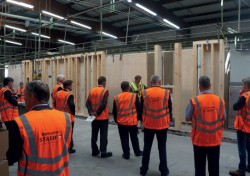Knowledge and performance was the mantra for the recent European research trip undertaken by a group of Barratt Developments Board Directors and Senior Managers, plus key UK suppliers, who all visited Germany and Holland to study offsite manufacturing techniques and new housebuilding technologies.
The intensive three day research trip, organised by Barratt Developments plc, Radar Communications and leading offsite experts Cogent Consulting, took in a range of offsite manufacturing facility visits, show villages, demonstration houses and live construction sites with the aim of understanding new technologies and techniques in two European countries that have parallel housing demand profiles and many similarities with the UK in terms of traditional construction skills shortages.
The purpose of the trip was primarily for knowledge exchange and reciprocal visits will be hosted by Barratt Developments and the key supply chain partners in the UK later this year.
Preparing for the Future
With a clear goal of achieving 20% offsite construction by 2020 the research trip was arranged three years in to a significant offsite strategy that has seen Barratt Developments embrace timber frame technology, floor cassettes, panelised roofing systems, large format masonry walling systems, light steel frame technology and precast garages. Bathroom pods and prefabricated utility cupboards (PUCs) are also being deployed in their apartment developments, primarily within the London region.
“We are absolutely committed to offsite and MMC (modern methods of construction) technologies,” said Steven Boyes, Chief Operating Officer at Barratt Developments plc. “As the UK’s largest housebuilder we like to think we lead the housebuilding industry in this area, not least because of the breadth of technologies we are actively trialling and the strength of our supply chain relationships. Our move to embrace offsite technology is also based on addressing the long term skills shortage that we are seeing in the UK housing sector and to help ensure predictability of build cost and programmes. It’s vital that all of the technologies we use and offsite supply chain partners that we select can work with us effectively to deliver the high quality that we need.”
The process of selecting the technologies and offsite supply chain partners that Barratt Developments currently work with in the UK, which includes Stewart Milne Timber Systems (SMTS), SIG Roofspace, Fusion Building Systems, H+H and CRH Tarmac, has been a structured one. It has involved completely open dialogue, prototyping and trial builds, with Barratt Developments’ technical and innovation team managing the deployment and measuring key performance indicators in collaboration with the selected regional management team.
Oliver Novakovic, Technical and Innovation Director at Barratt Developments, has spearheaded the offsite technology and supplier selection approach since joining the company in 2014. “Our approach to implementing our offsite strategy has been one of ensuring that we create the right culture for innovation, communication and dialogue with potential offsite manufacturers,” says Oliver. “We recognise that the offsite supply chain holds an immense amount of knowledge about their processes, materials and technologies and the key for us is to tap in to that knowledge rather that approaching them with a dictatorial culture. They recognise that we know housebuilding and that we understand the demands, likes and dislikes of our customer base. We also intimately understand our cost base and the performance specifications that are required from these new technologies.”
As the UK’s largest housebuilder Barratt Developments is celebrating its 60th anniversary this year, having built over 450,000 homes since 1958. In 2017 the company completed nearly 17,500 homes, both private and social/affordable, with typically 350-375 live sites at any point in time. These sites are delivered by 27 operating Divisions that directly employ over 6,000 people and support over 11,000 sub-contractors and suppliers.
This scale of operation presents real opportunities for supply chain engagement based on volume demand, but it also presents technical, cultural and communication challenges when seeking to implement any new or modern method of construction.
To read full article, please go to Offsite Magazine









